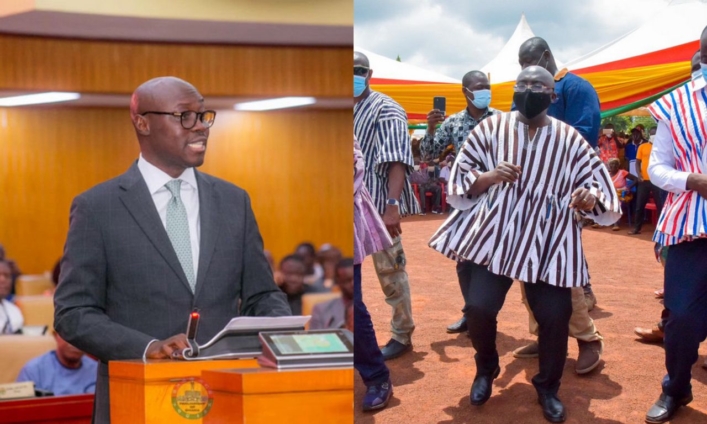The Minority says that the current challenges facing the Ghana Cedi are far from resolved, and the situation is expected to worsen.
With the local currency reaching GH₵15, traders caution that they are transferring the costs to consumers, resulting in a notable rise in the prices of goods and services.
Speaking to journalists in Parliament on Wednesday, Minority Leader Dr. Cassiel Ato Forson lamented the detrimental effects of the Cedi's depreciation on businesses in areas like Okaishie, Abossey Okai, Kejetia and other commercial districts.
He explained that "In spite of the huge inflows of foreign exchange from the IMF and the World Bank, into the Ghanaian economy, and I'm talking of billions of Ghana cedis, billions of US dollars, the government's action and its management of the cedi have continued to fuel steep depreciation with no end in sight unfortunately."
"So far, the decisions of the Economic Management Team, chaired by our Vice President Alhaji Bawumia leaves a lot to be desired. The reality of the Ghanaian economy today exposes the credentials of the so-called economic wizkid who was marketed as the savior of Ghana's economy. Alhaji Bawumia’s credibility is now tatters.
He was worried that the Dr Bawumia who doubles as the New Patriotic Party's flagbearer is too fixated on his campaign for election than rescuing the ailing currency.
"I want to use this opportunity to urge the Vice President to quit his off-beat dancing on the campaign trail and focus on the dancing cedi. There's a lot awaiting our country as a result of reckless mismanagement by Alhaji Bawumia’s government."
This comes as traders across the country are crying foul over the devastating impact of the depreciating currency on their activities.
The business community is up in arms as the development has left some of them running into debt.
According to the Food and Beverages Association of Ghana (FBAG), the model of many entrepreneurs involves selling on credit, which has made it difficult for importers to pay back.
Speaking on Top Story on May 14, FBAG's Executive Chairman, John Awuni described the situation as a crisis as many products.
"It is a massive disaster because we see the working capital of most of the businesses being eroded."
"Some of the businesses have even stopped selling because they don't even know how to price it. Ghana is generally a credit market, they receive supply from abroad on credit and they give to the Ghanaian distributors or wholesalers and retailers on credit."
He further explained that "by the time they pay you the money for you to buy the dollar and pay back your suppliers, you are in serious trouble."
But FBAG is not the body feeling the pinch.
Earlier, the Ghana Union Traders Association (GUTA) also expressed its frustration over the current state of the local currency.
Latest Stories
-
Bawumia joins thousands in Kumasi for burial prayers for Ashanti Regional Imam
2 hours -
Blue Gold Bogoso Prestea Limited challenges government actions in court
3 hours -
Syria not a threat to world, rebel leader Ahmed al-Sharaa tells BBC
3 hours -
Patrick Atangana Fouda: ‘A hero of the fight against HIV leaves us’
3 hours -
Trinity Oil MD Gabriel Kumi elected Board Chairman of Chamber of Oil Marketing Companies
4 hours -
ORAL campaign key to NDC’s election victory – North America Dema Naa
4 hours -
US Supreme Court to hear TikTok challenge to potential ban
4 hours -
Amazon faces US strike threat ahead of Christmas
5 hours -
Jaguar Land Rover electric car whistleblower sacked
5 hours -
US makes third interest rate cut despite inflation risk
5 hours -
Fish processors call for intervention against illegal trawling activities
5 hours -
Ghana will take time to recover – Akorfa Edjeani
6 hours -
Boakye Agyarko urges reforms to revitalise NPP after election defeat
6 hours -
Finance Minister skips mini-budget presentation for third time
6 hours -
‘ORAL’ team to work gratis – Ablakwa
6 hours

